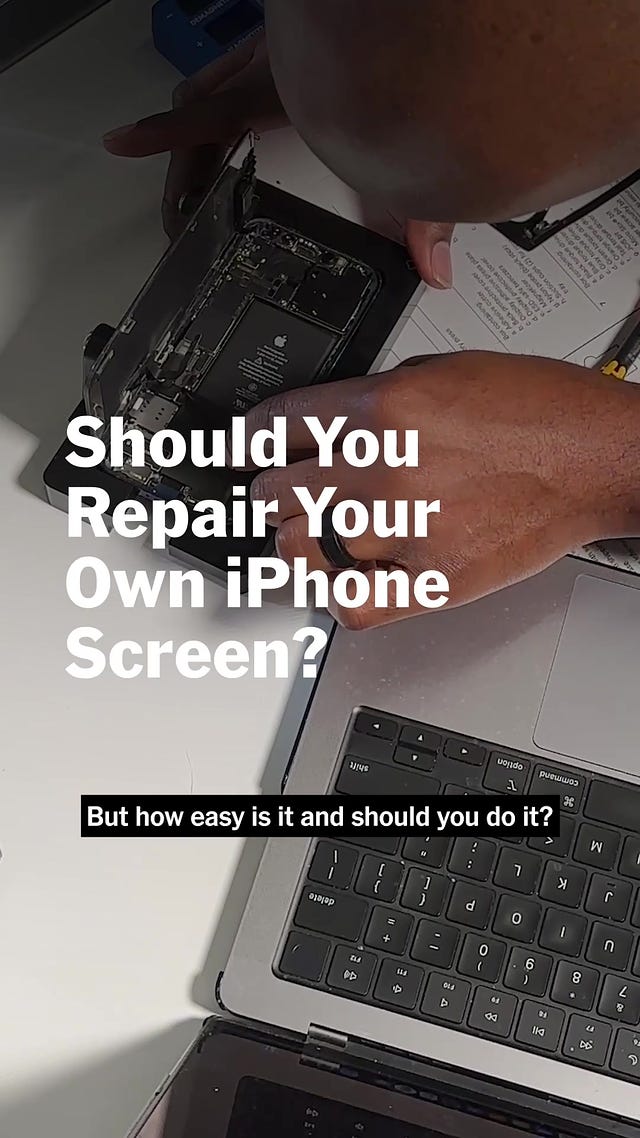Samsung's "Pro Repair" Mask Drops As iFixit Walks Away
A report finds Samsung's contracts are hamstringing independent repair shops - and iFixit, which said it is exiting its agreement to be Samsung's replacement parts marketplace.
For much of the last two years, Samsung -a major supplier of personal electronics - has been promoting itself as a repair-friendly manufacturer committed to promoting sustainable and long-lived devices. On Thursday, however, the company’s “pro repair” mask dropped -hard.
First, 404 Media, the journalist-run investigative reporting outlet (support their work here) ran a story exposing the onerous terms of Samsung’s contracts with independent repair shops.
Samsung: it puts the customer info in the basket!
Among other things, the manufacturing giant demanded that independent repair shops give it customers’ names, contact information, phone identifiers, and customer complaint details.

Even more alarming: Samsung’s contract requires independent shops to “immediately disassemble” any Samsung phones brought to the shop that use aftermarket or third-party parts and to “immediately notify” Samsung of the customer’s use of aftermarket parts, 404 reported, citing a copy of a Samsung contract it obtained.
As experts pointed out: that requirement would effectively instruct independent repair shops to remove functioning, non OEM parts from phones brought in for repair regardless of the nature of the repair. Shops who complied might find they are effectively breaking the customer’s device, returning them a non-working device, and ratting the customer out to Samsung in order to adhere to the terms of Samsung’s contract.
Such requirements likely run afoul of federal law, including the Magnusson Moss Warranty Act , a 1970s law that forbids manufacturers from restricting or banning the use of aftermarket parts. It also likely runs afoul of new state right to repair laws passed in New York, Minnesota, California and Oregon that forbid restrictive contracts such as the one reported by 404 Media.
iFixit: We’re done
And onerous conditions imposed by Samsung weren’t limited to independent repair shops.
On the same day as the 404 Media story ran, iFixit the online repair hub, said that it was terminating a nearly two year old agreement with Samsung to help the company sell replacement parts and repair kits for a range of Galaxy smart phones and tablets. At issue: many of the same problems, including restrictions imposed on the company on repairs and invasive disclosure requirements.
“We were limited to 7 parts per customer per quarter. That limit effectively barred repair shops from purchasing from us unless they became an IRP,” wrote Kyle Wiens, iFixit’s CEO and co-founder in an email. (IRP is an OEM-recognized “independent repair provider”).
Samsung also required iFixit to share customer information resulting from purchases of OEM parts through iFixit, which iFixit disclosed to customers at the time of purchase.
In a blog post, iFixit’s Scott Head said that the company “aimed to set the gold standard for repair documentation and empower local independent repair businesses with the tools and parts they needed to thrive, all while keeping Galaxy devices running.”
However, despite iFixit’s concerted efforts in recent months, the company faced “obstacles that made us doubt Samsung’s commitment to making repair more accessible.” In addition to arbitrary limits on how many replacement parts it could sell to independent shops, Head said Samsung’s part prices were “so costly that many consumers opted to replace their devices rather than repair them.” Even more frustrating: the company continued to lean into product designs that frustrated repair, for example: by gluing devices together and bundling parts in ways that also inflated the cost of repair by preventing owners from purchasing just the part they needed.
The result? Starting June 2024, iFixit will no longer be Samsung’s designated third-party parts and tools distributor. However, with its hands now untied, iFixit is free to sell as many replacement parts as its customers want. iFixit said it will continue to sell parts and repair fix kits for Samsung devices, “sourcing OEM parts when available and clearly indicating whether parts are original or aftermarket,” as it does for other manufacturers like Apple or Microsoft.
This isn’t the first time iFixit has been burned by the South Korean firm. In 2017, the company sought iFixit’s help to stand up a site devoted to “upcycling” old Samsung Galaxy devices - finding new uses and applications for old hardware. After joining with Samsung to launch and promote the initiative, however, iFixit said the company “ghosted us” and never moved the Galaxy Upcycling initiative forward.
Exposed: OEM’s lies about independent repair
This is one of those stories to remember next time you find yourself listening to industry lobbyists or executives from device makers talk about how right to repair laws aren’t needed because they’re ‘happy to work with independent repair shops.’
But there’s always a caveat: they’ll work with independent repair shops that meet the manufacturer’s “standards” or otherwise get “certified” to do repairs on their devices. While that might sound like a reasonable expectation, the devil is in the details (aka small print) of such arrangements, and Samsung’s onerous contracts are Exhibit 1 in the kinds of outrageous asks manufacturers make of small, independent shops.
Such ‘poison pill’ conditions are why independent repair shops prefer to remain independent, even if that means foregoing certain repairs and turning away business. They’re also why more right to repair laws in the states - and a federal right to repair law - are urgently needed!
Got a repair story? The FTC wants to hear it!
When trying to get a product fixed, you might find yourself in a fix. That’s why the FTC wants to hear what happened if you recently tried to get a product repaired.
The FTC has set up a special link for your warranty or repair stories. The Commission is interested in learning about your experiences across a wide range of products – from cars, kitchen appliances, and cell phones to grills and generators.
Did the manufacturer require you to use their authorized repair provider or void your warranty? Did you struggle to find an independent repair option or replacement parts to do your own repair? The FTC wants to know!
Other News
Nikon adds DIY repair section to its website
The battle for camera repair has mostly been a tale of sorrow and defeat in recent decades. Where camera repair shops were once commonplace, almost all have disappeared as camera makers started restricting access to replacement parts and information, starving independent repair shops of what they needed to survive. Nikon, for example, stopped selling replacement parts to independent shops more than a decade ago. But news this week suggests that maybe things are starting to turn around. DIYPhotography.net reports that Nikon launched a self service repair section on their website where Nikon camera owners can get access to detailed repair manuals. So far, its slim picking: the manuals are limited to just three items: two laser rangefinders and the Nikon Nikkor Z 28-400mm f/4-8 VR lens. However, there is hope Nikon will expand this service to include manuals for more models, especially older, discontinued ones that are no longer serviced by the company. Stay tuned!
Assistant US AG Talks Up Pro-Repair Stance at Anti Monopoly Summit
In a speech at the American Economic Liberties Project 2024 Antimonopoly Summit Assistant Attorney General Jonathan Kanter talked up the Department of Justice’s defense of repair as part of efforts to limit monopolies and anti-competitive practices Remarks. Kanter noted the DOJ’s statement of interest in a class action lawsuit by farmers against equipment maker John Deere case, which contributed to a federal judge denying a motion to dismiss the lawsuit and vindicating that the antitrust laws protect the right to repair.
Kantor also noted that the DOJ has filed an interagency comment for the Copyright Office’s Right to Repair rule making.
NYT Wirecutter: should you repair your iPhone?

 Tiktok failed to load.
Tiktok failed to load.Enable 3rd party cookies or use another browser
Shocker: RV makers don’t think Right to Repair should apply to them
You’ll be shocked to read that a group representing RV manufacturers has come out with a statement opposing the REPAIR Act, proposed federal legislation that would give car owners and independent repair shops access to vehicle telematic information needed to diagnose problems and carry out repairs. The statement published on the RV Industry Association website, makes a gesture in support of right to repair laws before declaring a legal right to repair RVs a step too far. The REPAIR Act (H.R. 906), which requires the sharing of telematics data “could create critical gaps in cybersecurity protections and risk driver safety and privacy,” the Association said. That echoes arguments from traditional consumer vehicle manufacturers. But RVs are different from vehicles and should be exempted, the group said. “RVs are essentially vehicles with home-like amenities. OEMs don’t have access to the data generated by non vehicle systems and therefore shouldn’t be expected to provide “information, sensitive data, or access that it doesn’t have access to or knowledge of.” Umm…OK. So let’s keep it focused on the “front end,” right? ¯\_(ツ)_/¯
Automakers admit to giving up driver data without a warrant
Automakers have made a show of protecting driver data in their vocal opposition to right to repair laws - for example by suggesting that a 2020 expansion of Massachusetts vehicle right to repair law would enable cyber stalkers. But, as it turns out, automakers have been readily sharing drivers' data with lawyers and law enforcement without a warrant, the website Ratchet and Wrench reports. That’s in apparent violation of the Alliance for Automotive Innovation's Consumer Privacy Protection Principles, a 2014 pledge that automakers made to protect drivers' location, biometric, and behavior data from third parties without a court order. In testimony before Congress, representatives for 8 automakers including Toyota, Subaru, and BMW said they would comply with subpoenas—which do not require judge approval—contrary to earlier promises of needing a court order. Senators Ron Wyden and Ed Markey criticized the automakers for not adhering to their 2014 agreement, considering it a breach of trust.
In related news, the FTC might be considering legal action against the auto industry for lax privacy standards, according to TechDirt. An FTC blog post on May 14th disclosed that the “connected car” industry has been on the agency’s “radar for years,” and hinted at potential future actions. That follows damning revelations, including a 2023 report by Mozilla that declared automobiles had the worst security and privacy standards of any major technology industry the organization tracks.
iPad Pro 13’s Hide a Repairability Win, Still Hard to Fix
The new iPad Pro is getting a lot of attention - not least of which is because of Apple’s tone deaf commercial celebrating the device in which an iPad Pro crushing human implements. (Oof!) But all that hoopla overshadowed some important improvements in the latest iPad when it comes to repairability, according to a write up by iFixit. Among other things: iFixit’s teardown notes a vastly improved battery design that makes swapping out the battery on an iPad much easier. However, as iFixit notes in its write up, Apple’s prioritizing of thinness resulted in design decisions that frustrate repair - such as liberal use of glue to hold components together.
TED Radio Hour: Reduce, Reuse, Recycle? How about Repair, Repurpose, Reimagine
"Reduce, reuse, recycle." We've heard that for decades—but does it work? This hour, TED speakers reimagine the well-known slogan and reconsider how we think about what we consume and throw away. Check it out!




